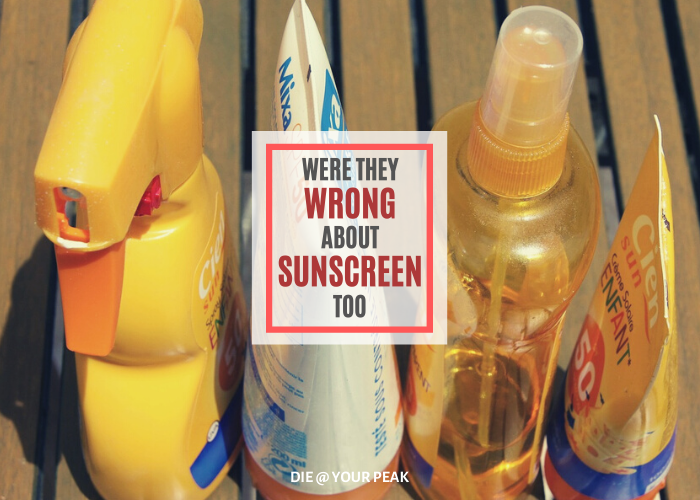Margarine, Cigarettes, Anti-Bacterial Soap and now potentially sunscreen? These items were supposedly healthy at one point; now deemed as not only unhealthy but potentially harmful. More is not necessarily better. Here are some articles that discuss information about sunscreen, cancer and sun exposure.
Sunscreens And What The Skin Can Produce
Supplements have been selling like smartphones for many decades. Though, because of recent studies, some of them have been getting backlash. One that stands the test of time is Vitamin D, manufactured by skin primarily through sunlight, probably due to countless benefits it brings including prevention of certain diseases such as osteoporosis, heart attack, stroke, depression, cancer, diabetes, obesity, cognitive impairment, autoimmune conditions, and more. Many of us are still not getting enough of this since most jobs are indoors and when we go out, we wear sunscreens, which in turn blocks the sun’s rays. So, we just take vitamin D supplements to compensate for not getting it from the outside. But what’s mind-boggling about this is a couple of recent studies showed that vitamin D supplementation has no benefit on us, even with larger doses, it doesn’t do much with heart disease, cancer or stroke.
There are researchers who argued that people with high vitamin D levels are so healthy not because of the vitamin itself but because of their exposure to the sun. They said that exposure to the sun for at least 30 minutes lets the skin produce nitric oxide, which lowers blood pressure and dilates blood vessels, lowering the risk of heart disease and stroke. Sunscreen may be a big culprit when it comes to producing nitric oxide which can help us prevent certain diseases.
Sunscreens, Plourde, And Cancer
Upon evaluating whether sunscreens can cause cancer, they say it’s complex and that benefits outweigh the risks. But Elizabeth Plourde seems to disagree. She claims that sunscreens don’t protect us from skin cancer, rather they cause it. In her book, Sunscreens Biohazard: Hazardous Waste, she discusses the negativity sunscreens can bring such as cancers, endocrine problems, infertility, autism, and destroying coral reefs. She even argued that if sunscreens really work, then skin cancer cases should have plummeted since many people use the product. The writer of the article didn’t believe Plourde’s claims because the rise of skin cancer incidences does not conclude that sunscreens don’t work or causes cancer. It’s not even confirmed that sunscreens can cause melanomas. There are just too many plot holes in her book.
Sunscreens And Cancer Risk In The U.S.
Steven Wang, a dermatologist slammed the outdated American sunscreens because of its lack of protection from the UV rays. He said that European, Australian, Japanese, and Canadian sunscreens do a better job in protecting against skin damage than what we have here. A huge reason for this is that U.S. has stricter approval guidelines and standards, compared to other countries, when it comes to using more effective ingredients, filters, and products, thus limiting the options against harmful sun’s UV. If Congress would just approve the newer sunscreen filters and not be too strict about it, then it can lead to better sunscreens. Better sunscreens mean better skin protection that could prevent more skin cancers.
Sunscreens And SPF
Many of us who wants extra protection from the sun would buy sunscreens with SPF higher than 50. Though, that should give us extreme protection from damaging UV rays, that’s not really the case in practice. Some experts claim that using high SPF sunscreens can even expose us to high UV radiation. Using high SPF doesn’t mean it doubles the protection. In science, SPF 30 filters out UVB only 1% less than SPF 50 and 2% less than SPF 100. That means there’s only a small difference between them. There’s a false sense of security as well in using higher SPFs, thinking we can stay out in the sun much longer and not reapply sunscreen. We’re to confident because we used a higher SPF but the truth is, we need to reapply after 2 hours of exposure and wear other protective gears such as hats, sunglasses, shades, and long-sleeved shirts.
It’s recommended that instead of using higher than SPF 50 sunscreens, use SPF 30 with “broad spectrum” label. This means we are given more protection from both UVB (causes sunburn) and UVA (causes skin aging and tanning) radiations.
In general, unless we’re allergic to its substances, there’s nothing wrong in applying sunscreens under extreme sunlight condition. It’s a good photoprotective tool to somehow, help shield our skin from intense UV rays. There are a lot of studies about sunscreens, but most of them are not yet confirmed. Science and health are fields of complexity and continuous research. Many factors play why we encounter certain health and environmental issues, but to blame it all to using sunscreens is just a bit narrow. Still, we should always be updated on the latest news and studies about it.
